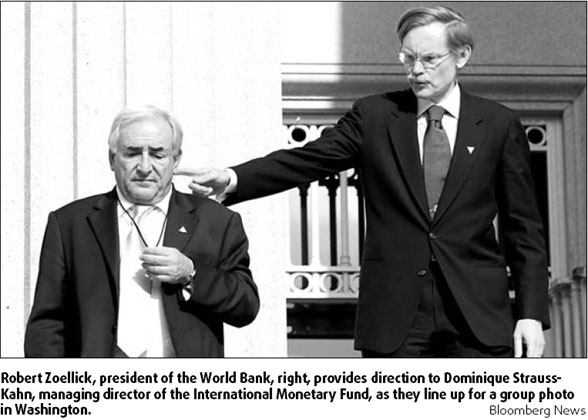World Bank cuts growth forecast

Global economic growth will probably slow to 2.7 percent this year from 3.7 percent in 2007, checked by spiraling food and energy prices and the subprime credit crisis, the World Bank said.
Developing countries should be less affected, with their economies expanding on average 6.5 percent, down from 7.8 percent, the Washington-based lender said yesterday in its Global Development Finance report released in Cape Town, South Africa.
"The slowdown in high-income countries has become more apparent since the end of 2007," the bank said. "The continued strength of domestic demand and imports in developing countries is helping to cushion the global effects of the slowdown in high- income countries."
In January, the World Bank forecast global growth of 3.3 percent for this year, while the International Monetary Fund in April predicted 3.7 percent. The growth outlook has deteriorated as record oil and food prices stoke inflation and trim output. Oil traded in New York jumped to a record $139.12 on June 6.
"Inflationary pressures are becoming more and more of a problem," Hans Timmer, one of the report's authors, told reporters. The risks posed by rising oil prices are "much more serious than before".
The World Bank expects the US economy to expand 1.1 percent this year, half of what it grew in 2007 and lower than a previous prediction of 1.9 percent. Growth in the 15-nation euro area will probably slow to 1.7 percent from 2.6 percent, while in Japan it may ease to 1.4 percent from 2 percent, the bank said.
Growth in South Africa is expected to slow to 4.2 percent from 5.1 percent. Nigeria's economic growth rate is expected to rise to 7.9 percent from 6.1 percent as it benefits from increased oil prices.
For developing nations, "the inflationary risk and impact of high food and oil prices pose an even more serious challenge than the effects of the US slowdown and financial turmoil", Timmer said. Some of them are already "feeling the heat of the international environment", especially those that have large current-account deficits.
The Global Development Finance report shows net private investment in developing countries surged by $269 billion last year to a record $1.03 trillion, with the bulk of the money going to Brazil, India, Russia and China. It forecasts those investment flows will drop to about $800 billion by next year.
Agencies
(China Daily 06/11/2008 page17)








